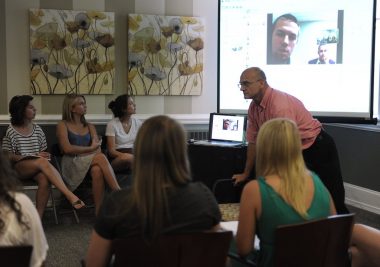A new series aims to bring students, faculty and staff together to discuss current events and devise possible action plans for tackling social ills.

A famine in the Horn of Africa has already killled tens of thousands of people, and on Thursday afternoon in the commons of the West residence hall, Elon University students, faculty and staff gathered to talk about crisis and the political and social issues that exacerbate the disaster.
The Sept. 1 discussion led by Tom Arcaro, a professor of sociology and director of Project Pericles at Elon, was the first in an inaugural series – “First Thursdays Current Issues Forum” – co-sponsored by Project Pericles and the Office of the Vice President for Student Life.
“I don’t see these as sessions where students get a lecture. We only have a short window of time, and I don’t want to set the tone that this is another class,” Arcaro said. “I want this to be as much of a catharsis, a voicing of confusion or concern, and a directing of energy in a positive direction.
“Especially for the first year students, it’s good to see that Elon does respond to things like this and that they have additional places to learn outside the classroom, where people can come to get up to speed.”
Located in the “Horn of Africa,” Somalia is one of the poorest and most violent countries in the world. Two missed rainy seasons in 2011 has left the country in one of the worst droughts in 60 years.
Arcaro was joined by Andrew Haile, an immigration counselor with the Elon Law Immigration Clinic, who offered commentary via Skype from the law school in downtown Greensboro, N.C. The clinic has assisted more than 30 immigrants from Somalia, many with family still living in the devastated region.
Among the topics mentioned in the forum: how not all nonprofits are efficient with the use of donated money, the corruption in some nations that keeps aid from arriving, and the global climate change that is contributing to weather patterns that destroy crops.
Students shared various observations after the discussion. Some, like Elon junior Eliza Gibson, were Periclean Scholars with an active interest in global issues. Gibson, a human services studies major, said it was important for students to learn that just because Americans think of particular solutions – such as simply donating more food to the region – that it doesn’t necessarily mean there aren’t better courses of action.
“It really takes knowing what’s happening on the ground to understand the situation,” Gibson said. “You come into this thinking, ‘well, we can just send food.’ But there’s a system of corruption in many areas there, and it takes people there telling us about it to more effective. This is more complex that we realize.”
Freshman Ted Lee, who recently moved to campus from his home in California, joined his friends when they said they were taking part through a Global Studies class.
“I tagged along because I thought it would be interesting,” Lee said. “This is different than anything in high school. I’m already learning that the world has so many more problems than we can comprehend.”


